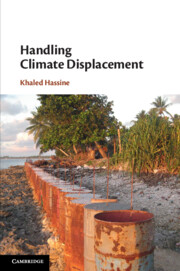Book contents
- Handling Climate Displacement
- Handling Climate Displacement
- Copyright page
- Dedication
- Epigraph
- Dedication
- Contents
- Foreword
- Preface
- Acknowledgments
- Author’s Note
- Requiescat in Pace
- Abbreviations
- Prologue
- 1 Research Framework
- 2 Connecting the Dots
- 3 Protection Challenges and Policy Options
- 4 A Framework for Handling Climate Displacement: The Peninsula Principles
- Conclusion
- Bibliography
- Annex
- Index
1 - Research Framework
Published online by Cambridge University Press: 08 August 2019
- Handling Climate Displacement
- Handling Climate Displacement
- Copyright page
- Dedication
- Epigraph
- Dedication
- Contents
- Foreword
- Preface
- Acknowledgments
- Author’s Note
- Requiescat in Pace
- Abbreviations
- Prologue
- 1 Research Framework
- 2 Connecting the Dots
- 3 Protection Challenges and Policy Options
- 4 A Framework for Handling Climate Displacement: The Peninsula Principles
- Conclusion
- Bibliography
- Annex
- Index
Summary
In December 2015, the world looked toward Paris. For more than twenty years, the international community had been trying to reach a universal, binding agreement on climate change. Paris was the international community’s litmus test: States would either reach consensus on a multilateral instrument or it would be the end of the United Nations’ efforts to forge global action on climate change. After two weeks of frantic negotiations, there was a historic breakthrough and the Paris Agreement was eventually adopted.
The Paris Agreement is hailed as a turning point. States, including developing nations, committed to reducing their greenhouse gas emissions. Developed countries also pledged to assist developing States, including through financial support, in their efforts to reduce emissions and to provide aid to those countries affected by climate-related disasters.
Information
- Type
- Chapter
- Information
- Handling Climate Displacement , pp. 3 - 25Publisher: Cambridge University PressPrint publication year: 2019
